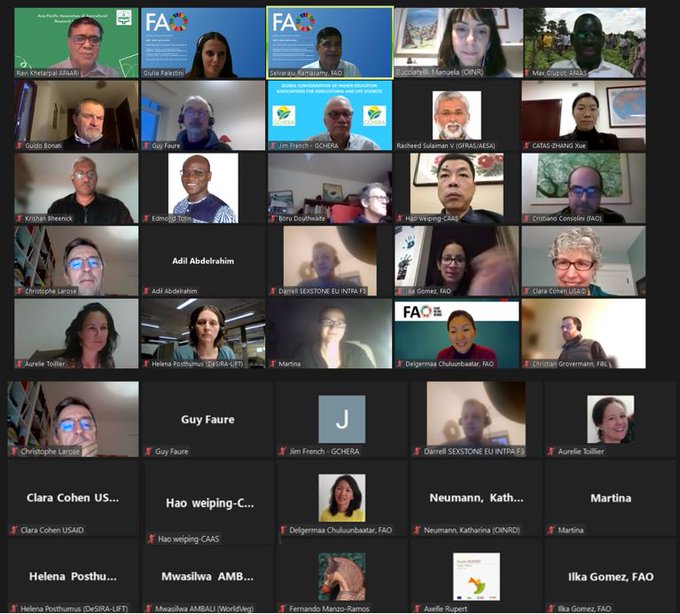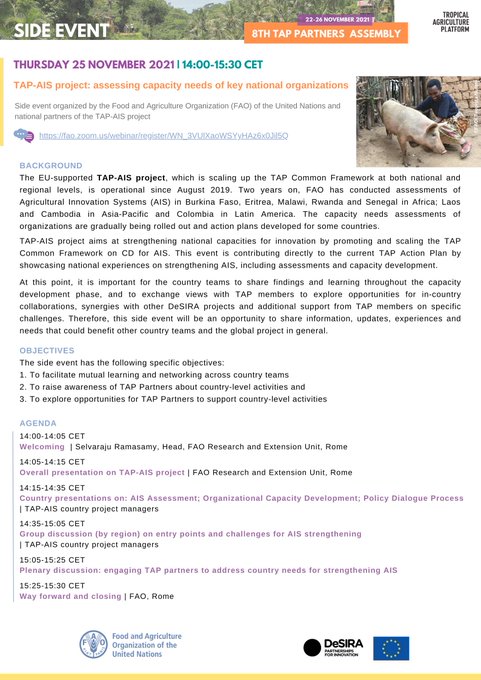- The TAP-AIS project is funded by the European Union (EU) and implemented by the FAO.
- Project duration August 2019 - July 2024
- Budget 5,000,000 EUR
Its objective is to increase the coherence and effectiveness of capacity development interventions for agricultural innovation systems, so they can lead to sustainable change and impact at scale. Since its launch, TAP and its 52 Partners have embraced the Agricultural Innovation Systems (AIS) perspective, acting as a multilateral dynamic facilitation mechanism that enables better
coherence and greater impact of Capacity development interventions in AIS.
The science-policy interface is a key component of the innovation capacity of a food system. In this side event, various stakeholders reflected on their experiences with various science policy interfaces and share their lessons learnt on questions such as:
25/11 TAP-AIS project: assessing capacity needs of key national organizations
Two years on, FAO has conducted assessments of Agricultural Innovation Systems (AIS) in Burkina Faso, Eritrea, Malawi, Rwanda, Senegal; Laos, Cambodia and Colombia. The capacity needs assessments of organizations are gradually being rolled out and action plans developed for some countries.
TAP major achievements include the development and piloting of a Common Framework on Capacity Development for AIS (2015-2019), as well as practical tools and capacity development manuals, the integration of the TAP concept and approaches in to Strategic Plans, programmes and projects of the Partners, and development of TAPipedia,
The seventh TAP Partners Assembly comprised: 2 virtual meetings/sessions and Side-events on specific topics organized by TAP Partners.
Extracts of programme on side events
22/11 Strengthening the policy innovation capacity of food systems: how to engage in the science-policy interface?
Side event organized by the European Alliance on Agricultural Knowledge for Development (Agrinatura), the DeSIRA-LIFT project, the Directorate-General for International Partnerships of the European Commission (DG INTPA) and the DeSIRA initiative.The science-policy interface is a key component of the innovation capacity of a food system. In this side event, various stakeholders reflected on their experiences with various science policy interfaces and share their lessons learnt on questions such as:
- What capacities are needed to address policy issues and engage with policy makers?
- How to develop interactions between research and policy?
- What is the right level of interaction with policy makers?
- Ismahane Elouafi, FAO Chief Scientist
- Helena Posthumus (Agrinatura / WUR, DeSIRA-LIFT)
- Keynote presentation: Engaging successfully in the science-policy interface: the case of viticulture in France | Jean-Marc Touzard (INRAe)
- Koffi Alinon (CIRAD)
- Selvaraju Ramasamy (FAO)
- Kwaku Antwi (FARA)
- Guy Faure (DG INTPA)
- Closing remarks | Christophe Larose (DG INTPA)
22/11 Regional insights and challenges in investment in innovation for sustainable agriculture intensification,
Organized by the Commission on Sustainable Agriculture Intensification (CoSAI) in collaboration with the Asia- Pacific Association of Agricultural Research Institutions (APAARI), the Forum for Agricultural Research in Africa (FARA), and
FONTAGRO. See programme
25/11 Strengthening the Capacity of African Agricultural Innovation Systems: towards a Joint Action Plan (JAP) for Capacity Development in Africa’s Agricultural Innovation Systems
The CAADP ex-Pillar IV institutions-CAADP XP4, namely FARA, AFAAS, CORAF/WECARD, ASARECA, CCARDESA facilitate the strengthening of capacity among professionals and communities of practice in African institutions. The objective of the side event was to galvanize assembly members in aligning collective capacity development efforts towards confronting the challenges Africa’s AIS and supporting actions around climate emergencies & food and nutrition security, to drive inclusive agricultural transformation and improve livelihoods.- Moderator: Delgermaa Chulunbaatar
- Samson Eshetu, AFAAS
- Salim Nahdy, AFAAS
- Abdulrazak Ibrahim, FARA
- Karen Munoko, FARA, Youth and agribusiness
25/11 TAP-AIS project: assessing capacity needs of key national organizations
Two years on, FAO has conducted assessments of Agricultural Innovation Systems (AIS) in Burkina Faso, Eritrea, Malawi, Rwanda, Senegal; Laos, Cambodia and Colombia. The capacity needs assessments of organizations are gradually being rolled out and action plans developed for some countries. It's important for the country teams to share findings and learning throughout the capacity development phase, and to exchange views with TAP members to explore opportunities for in-country collaborations, synergies with other DeSIRA projects and additional support from TAP members on specific challenges. Therefore, this side event was an opportunity to share information, updates, experiences and needs that could benefit other country teams and the global project in general.
Overall presentation on TAP-AIS project | FAO Research and Extension Unit, Rome
- Delgermaa Chuluunbaata, Agricultural extension officer at FAO
- Manuela Bucciarelli, Project Management, Monitoring and Evaluation Expert.
Country presentations on: AIS Assessment; Organizational Capacity Development; Policy Dialogue Process
| TAP-AIS country project managers
- Moderator Anila Rahim - Pakistan
- Aristide Sempore - Burkina Faso
- Seyoum Teame - Eritrea
- Bun Thol - Cambodia
- Vornthalom Chanthavong - Lao DRC
26/11 Ways to Develop Agricultural Innovation Systems (AIS) via Integration of Industry-Education Research (IER)
The AIS is essential for sustainable agriculture development and innovation is one of the main driving forces. Industry, education, and research are basic factors that constitute to the AIS. Industrial demand fuels agricultural innovation and scientific research underpins agricultural development while education cultivates high-quality labor force. A virtuous cycle should be built to bolster the advancement of industry, education and research sectors.When industry raises a problem, solutions are found via research and cultivate talents to solve the issue, forming a “Three-in-One” mechanism. How to integrate the three factors to drive the agricultural innovation is a question needing further discussion. In order to map out specific ideas and measures for boosting AIS to spur the development of agriculture, Chinese Academy of Tropical Agricultural Sciences (CATAS) and Chinese Academy of Agricultural Sciences (CAAS) organised a webinar on Ways to Develop AIS via Integration of Industry-Education-Research.
- Opening remarks |Dr. Selvaraju Ramasamy, Head of FAO-Research and Extension Unit, Rome
- Welcome remarks |LIU Guodao, Vice President, CATAS, China.
- Development of AIS through IER Collaboration of CATAS | LIU Kui, CATAS
- Practices and Cases on International Cooperation for Agricultural Innovation Capacity of CAAS | HAO Weiping, CAAS
- Contributions of CATIE to breeding, agroforestry and education in the coffee sector of the Americas | Rolando Hermes Cerda Bustillos, CATIE
- AIS Development through IER Collaboration | John B. William, Alliance of Bioversity International and CIAT
- AIS Development through Industry-Education Research (IER) Collaboration of CABI | Claire Curry, CABI
- Practice and thought on AIS through Industry-Education Research (IER) Collaboration in Pakistan | Iqrar Ahmad Khan, University of Agriculture, Faisalabad, Pakistan @1:16:46 (video recording)
This volume summarizes a 101 entries (products) which seems to have an immediate commercialization value.
- There are new varieties of cotton and mustard with competitive advantage of determinate growth and potential for mechanical harvesting.
- Three new hybrids of maize with high pro-vitamin A contents are ready for release in the public domain. Transgenic sugarcane is in the testing process.
- Ten new mango selections are being promoted. Two new breeds of backyard poultry have been developed. A large number of mechanical and agricultural engineering innovations have been made available for industrial manufacturing.
- There are several soil amendments and databases created to improve soils and enhance fertilizer use. The plant and animal pests and diseases are being addressed through environmentally safe interventions. Water and energy solutions have been developed for easy adoptions with a focus on renewable options.
- A special emphasis has been placed on reducing postharvest losses and value addition to capture markets within- and outside Pakistan. New our blending and fortification technologies are made available to address the malnutrition in children and women. The value addition also includes value chain interventions and development of novel products like vaccines, textile stripping technologies, guar gum control of aflatoxins and silymarin extraction from a weed.
- An important limitation to agriculture is delivery of information and services to the farmer. Innovative
applications of ICT have been explored and offered for upscaling by the government and industry.
- AIS Development through IER Collaboration of iShamba | Martin Aketch, iShamba, Kenya
iShamba Farmer Insights (35 p.) - Mercy Corps’ AgriFin is funded by the Mastercard Foundation and Bill and Melinda Gates Foundation to help organizations design, test and scale digitally-enabled services for Africa’s smallholder farmers.
- iShamba’s unique services are positively impacting farms and lives. It can improve farmer satisfaction by addressing their challenges and incorporating their suggestions for improvement.
- Over 90% of farmers reported improvements in their way of farming, farm production and revenue, and overall quality of life because of iShamba’s agricultural information service. They spoke about improved knowledge and ability to plan farm activities, increased yield and volume sold, and having more food for consumption.
- Practices and thought on AIS through IER Collaboration of CGCOC Group | WANG Miao,
CGCOC Group, ChinaCGCOC is a mixed-ownership enterprise jointly funded by state-owned enterprises, management teams, local state-owned assets, overseas key employees and external natural persons. CGCOC has formed three regional centers in Africa, namely the eastern Africa, west-central Africa with English speaking regions and French speaking regions, covering 27 countries and accounting for 50% of the whole African countries, among which, CGCOC Nigeria Company has been established for 35 years. - Boost scientific and technological innovation: Construction of Big-data Platform for China Natural Rubber Industry Chain | LI Hantang, CATAS, China
- Concluding remarks | LIU Kui, CATAS








No comments:
Post a Comment